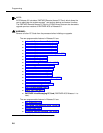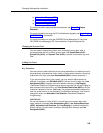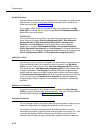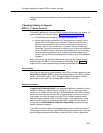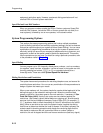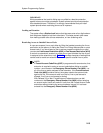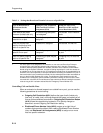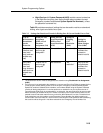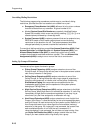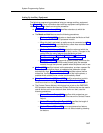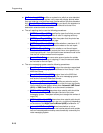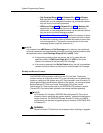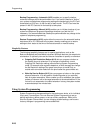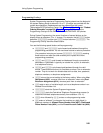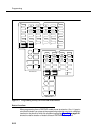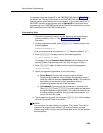
Programming
2-16
Overriding Dialing Restrictions
The following programming procedures provide ways to override all dialing
restrictions, provided the user has access to an outside line or pool:
■ Emergency Phone Number List (#406) defines a list of up to ten numbers
that can be dialed from any extension. A typical number is 911.
■ Marked System Speed Dial Numbers are specially identified System
Speed Dial numbers, which a user can dial by pressing
f (or # on a
standard phone) followed by a three-digit code.
■ System Password (#403) creates a password that can be entered at any
PARTNER-model or MLS-model system phone to override dialing
restrictions for the duration of a call. The system password should be
changed periodically to prevent unauthorized use and toll fraud.
To override all dialing restrictions except Line Access Restriction (#302), Pool
Access Restriction, and Night Service with System Password (#403), use
Allowed Phone Number Lists (#407) to create up to eight lists of outside
numbers that otherwise-restricted extensions
can
dial. Then use Allowed List
Assignments (#408) to assign one or more of the lists to an extension.
Setting Up Groups of Extensions
You can set up four types of extension groups:
■ Pickup Group Extensions (#501) assigns extensions to one of four
Pickup Groups. A Pickup Group lets any user in the system answer outside
calls for any extension in that group.
■ Calling Group Extensions (#502) assigns extensions to one of four
Calling Groups. A Calling Group lets users ring or page all extensions in
that group simultaneously or transfer calls into the group. (Additionally,
Simultaneous Paging lets users make announcements over the
loudspeaker paging system and the speakers of idle system phones
belonging to Calling Group 1.)
■ Night Service Group Extensions (#504) assigns extensions to the Night
Service Group. When Night Service is activated at extension 10, calls ring
immediately at Night Service extensions regardless of how they ring at
other times (only the lines assigned to an extension will ring).
■ Hunt Group Extensions (#505) assigns extensions to one of eight Hunt
Groups. (Hunt Group 7 is used exclusively for the voice messaging system,
and Hunt Group 8 is used exclusively for fax transfer and fax detection.) A
Hunt Group lets users ring or voice signal the first available (nonbusy)
extension in that group. If a ringing call is not answered, the system tries
each available extension in turn until the call is answered. If a
voice-signaled call is not answered, the call does not keep hunting. Also
use Group Call Distribution (#206) to assign outside lines to a Hunt
Group if you want outside calls to ring directly into a group.



